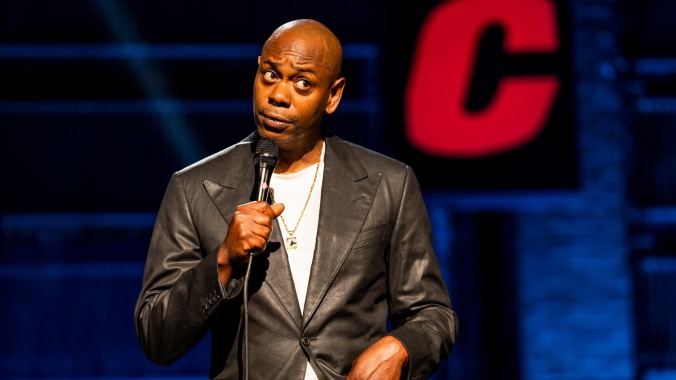Netflix now just posting Dave Chappelle's random self-aggrandizing speeches, apparently
What's In A Name isn't a new Chappelle special, but a speech that is, in part, about how everyone who criticizes him must be wrong

Netflix has made it very clear, over the last few years, that its unwavering support for Dave Chappelle and the transphobic comedy he continues to pepper into his various specials is not just a business stance (not least of which because some of the company’s own leaked metrics suggest it periodically overpays for Chappelle’s work) but a philosophical position. Co-CEO Ted Sarandos has made that personally clear in his many full-throated defenses of Chappelle, no matter how many times the comedian suggests, as he did in his 2021 special The Closer, that trans women and men aren’t “real” women and men, respectively, among other transphobic jokes (that all really round down to that singular joke that’s the only one that transphobes ever seem to know).
Just in case there was any doubt left, though, the streamer went out of its way to re-erase it today, releasing a new project at midnight last night titled Dave Chappelle: What’s In A Name. Despite its Netflix Is A Joke branding, What’s In A Name isn’t a new stand-up special; instead, it’s a speech Chappelle gave at a naming ceremony at Washington D.C.’s Duke Ellington School of the Arts last month—for a theater that was supposed to be named for Chappelle, until the controversy surrounding him (and questions from angry students) forced him to back off.
Chappelle takes his time getting to that part of the speech, though, instead giving a now-familiar recitation of his education, career, and especially the fallout after he walked away from the success of Chappelle’s Show 17 years ago. But get there he does, in typical fashion, i.e., by painting the students who stood up to him as indoctrinated children who can’t be blamed for being “tools of oppression.” Here’s the key bit where Chappelle really lays it all out, though, in a way that was presumably meant to come off as more righteous than petulant: “The more you say I can’t say something, the more urgent it is for me to say it. It has nothing to do with what you’re saying I can’t say.”
It’s a sentiment that dovetails nicely with the Duke Ellington quote plastered on the front of the speech’s Netflix presentation, about the need for art to be “dangerous”—without asking the all-important follow-up question: “Dangerous for who?” This has always been at the crux of Chappelle’s unwillingness to understand his critics, and a stance that Sarandos has parroted in internal Netflix communications: The idea that all speech is inherently good and harmless, despite the obvious evidence of both empirical research into the damage that normalizing transphobia can do to people’s mental well-being, and our own lived experiences on an internet that sometimes feels entirely made up of harmful speech.
Chappelle doesn’t reckon with any of that, of course; he just calls The Closer a “masterpiece” and himself a “once-in-a-lifetime talent.” Netflix, presumably, agrees, hence it posting the speech (with no indication of how much, if anything, it paid Chappelle for the privilege). We can’t wait to see what random errata of his life they decide to promote as front-page content next: Voicemails? Twitter drafts? Deleted Instagram stories? The possibilities are as limitless as the streamer’s apparently unending tolerance for his act.